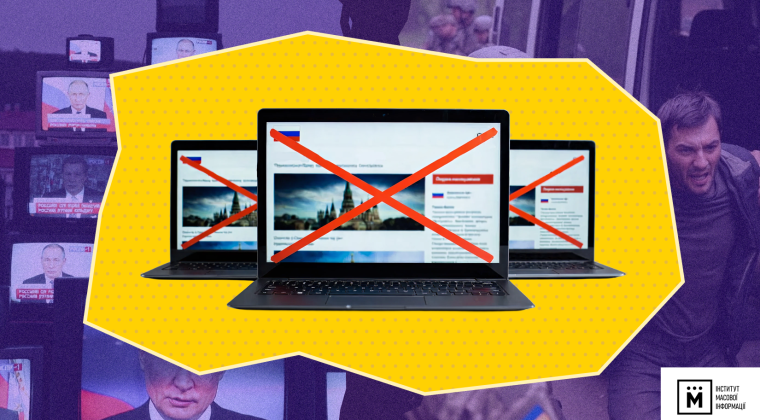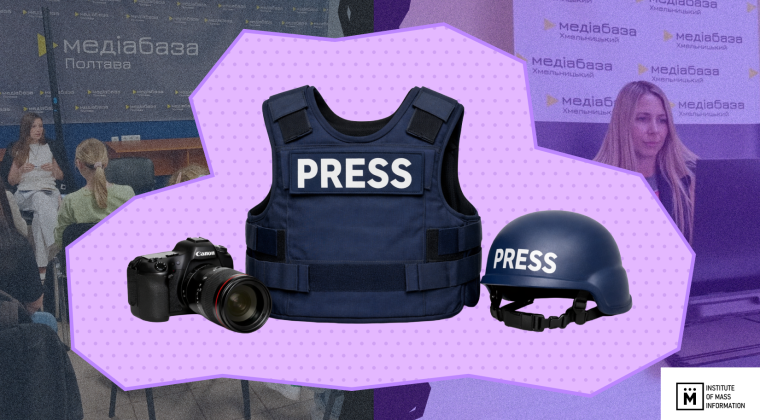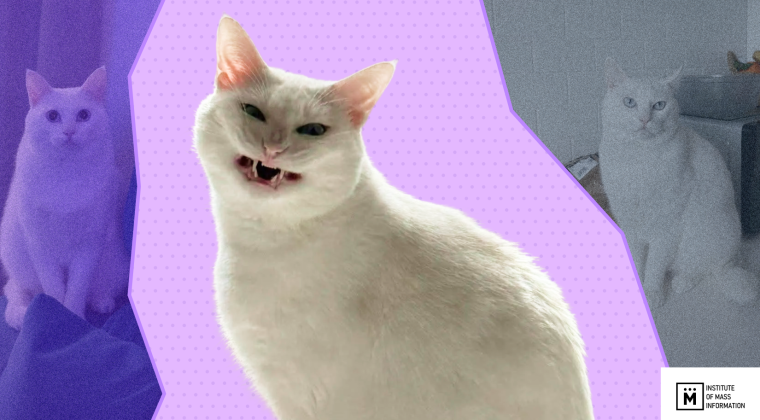The executive director of the Ukrainian Institute of Mass Information, Oksana Romaniuk, refused the German Palm Foundation Award after being nominated together with Russian journalist Alexei Venediktov. In her interview to Voice of America, she explained the reasons for her refusal in detail.
Ksenia Turkova: Oksana, were you surprised to hear that you have been nominated for this award together with Alexei Venediktov?
Oksana Romaniuk: I didn’t expect this. I learned about it in May, and, to be honest, back then I had too much on my plate to think about awards. I read the news with surprise, then wrote them a letter: thank you for nominating me, but I flatly refuse to take part in this. The organizers tried to persuade me, there was a long correspondence going on, and in the course of it, I realized that there was an empty gap in our understanding of each other, which had to do with our experiences and background. We are now going through violence, through the experience of defending our identity, and what Western Europe is offering – to reach out to the enemy, as they said to me – is impossible for us. I understand that their wish was completely sincere. They simply do not realize the full depth of this situation, they do not have to live with such a neighbor near the border.
K.T. And how did they explain it themselves?
O.R. You know, there is a kind of a division in the human rights movement: peacemakers and justice-seekers. Theirs was purely a peacemaking position: I was told that I should reach out my hand towards the enemy, in these exact words. And for me, this is unacceptable – and not only because of the situation in which we find ourselves. There is a certain sequence of events and acts that must happen before we can “reach out”. Victory, trials, punishment, repentance, as it was with Germany. We lost 42 journalists in this war, our colleagues… Just a week before the war, Oleksandr Makhov and I had been discussing training courses for journalists. Two days before the Russians killed Maks Levin, he had called me, he had ideas about journalists working on the front lines…
The second reason for my refusal is the personality of Venediktov himself. There are some Russians who are worthy of respect, the “Memorial” organization, for example – the result of their work is certainly valuable. But Venediktov has made a number of (controversial) statements about Ukraine, said that it was just a territory… In my opinion, he legitimized the situation with the freedom of speech crackdowns in Russia. I think that would be wrong. That it would be a kind of betrayal, with regards to my colleagues.
K.T. You mentioned “Memorial”. There was a similar situation recently with the Nobel Peace Prize, when the award was shared between Russian, Ukrainian, and Belarusian human rights activists. And even then there were questions – why pile the three together and, even if it wasn’t on purpose, endorse the Russian narrative about the so-called “triune nation”. Why do you think the West still perceives the post-Soviet countries as one, as they would say in English, package?
O.R. Because they are afraid of change. Any changes are dangerous, and it is easier for the West to pile us together into this kind of package than to expect something unknown from Ukraine. Suddenly, Ukraine became a player with its own point of veiw, a player that does not want to be shoved into this package, but wants to be in a package with Eastern European EU member countries. Ukraine has its own vision, some claims of its own. That’s awkward. The easiest way is to go back to the status quo, to bring us back into the Soviet paradigm. Once, before the war, some European diplomats said to me: “Why are you building something here at all, some kind of identity, if you will never escape Russia’s oppression anyway? You will still be chained to this burden, and it will not let you go, you have no chance.” It seems to me that they said this for the very same reason – fear of change.
And one more thing: we experienced, I would say, a sequence of such existential crises – the collapse of the Soviet Union, the 90s, revolutions – and so on. We have been going through these changes constantly, then we would recover and move on. But they (in the West) have not gone through such severe crises, which is, perhaps, why they are not ready to face them.
K.T. And what can be done about it?
O.R. I think there are several ways. One is to assert ourselves loudly, which is what we are doing. However, even though our aggressive position is understandable, it compels a certain target audience to shut themselves out, to turn into an armadillo of sorts, to wrap themselves in a cocoon with no movement, no development. Therefore, public declarations of our stance must be accompanied by dialogue, by explanations of this stance, providing facts. And the third way, well, is for us to keep doing our job, to move forward somehow, because there is simply no other way, it’s a matter of survival. Do not give up.
K.T. You wrote that it takes you a lot of work to dispel the Russian imperial enchantment. And what kind of work is it, exactly, and how can this enchantment really be dispelled?
O.R. This, too, requires taking action in several areas. The first area, in my opinion, is law. I still think that there should be a special tribunal against Russia, and I want to see this tribunal prosecute the propagandists, the people who were giving the orders, who contributed to this horrendous aggressive propaganda. By the way, we no longer just use the term “propaganda”, it is genocidal rhetoric that absolutely resonates with the Rwanda case: calls for attacks on civilian infrastructure, etc.
The second area is, of course, to work with the so-called Russian liberals. The recent incident with “Dozhd” demonstrated (at least for us) a sort of infantilism and unwillingness to take responsibility on their part. We were very surprised by this whole story. And it seems to me that this cluster should probably also be required to comply with ethical standards. It is unacceptable to use such words as “Belarussia” or “the Ukraine”. These are quite trifle examples, I don’t know how to put it better. They should have a more critical attitude towards themselves, engage in self-analysis, self-evaluation. They must realize that they cannot be above the conflict, they cannot say: this is just Putin’s war, and we are above the fray. You are not above it, you are part of this whole story.
The third group is the Russians with whom, I believe, we have a potential for dialogue. In fact, I had many Russian acquaintances before February 24, we used to be in touch. And after February 24, only two people from this circle of acquaintances wrote to me personally, and I know that they are very ashamed of this situation. They describe what is happening in terms that we understand. They say that they are ashamed to speak publicly because they don’t even know what to say. When some Russians come out on stage to receive some award and only talk about themselves, it just raises a lot of questions. So, in terms of change, I think that I would like to expect change to come from this third group of Russians, who are aware of the responsibility and the terrible impact of propaganda. It is a shame that their voices are very weak and they are almost invisible among all the well-known organizations with high publicity and a lot of funding.
K.T. You said one can’t be above the fray now. Nowadays, there is really a lot of talk about the fact that journalists cannot be emotionless or neutral during a war, that a journalist must clearly realize whose side they are on, because war is a black and white matter, there are no shades of gray to it. But some also say that it will be difficult to go back to to objective journalism after the war. What, in your opinion, were the main challenges the war posed for the Ukrainian media?
O.R. The challenges are many. If we talk about emotions, then you just have to do your best to adhere to professional standards. Whenever we have to deal with a particularly emotional story, we do a lot of consulting, discussions with our colleagues. There are currently several kinds of challenges. The first kind of challenges is, of course, content. 80–90% of all content now is war-related. It is just difficult to even write on any other topic. Although I see that online media are actively doing this, they keep exposing corruption, posting articles criticizing goverment officials. I am perplexed to see that our news telethon is still running: I believe that it has already exhausted itself, and that it’s time we say goodbye to it.
Safety is another challenge. Undoubtedly, every editorial team has already learned to get around in this regard, but a year ago I did not think that I would know how to quickly apply a medical tourniquet.
Another challenge is related to finances: peacetime connections, infrastructure have collapsed, many media outlets have lost their sources of funding, several hundred media outlets have closed down. And yet, every crisis is a kind of rebirth, and now many of our media are looking into financial solutions that require increased responsibility, stepping up the dialogue with their audience, and providing the exact kind of information that they want to see. Those are is no longer just media “in space”, funded by some local oligarch, those are media outlets that have a certain, specific niche, a specific audience. I think this is a plus.
There are challenges related to everyday life. We conducted a survey, and 97% of journalists admitted that they are under constant stress – related either to their own life, or to their family, or to their work. And another nuance: we are all constantly fighting for something. In different ways, there’s always something we don’t like, we are make statements all the time. Even the war did not stop this. As they say, these Ukrainians will never calm down!
Perhaps this is what makes us different from all the conservative countries which are so afraid of the pendulum swinging this way. Perhaps this is a sign of a young country that is in search of its own model. I believe that this is a sign of progress.



